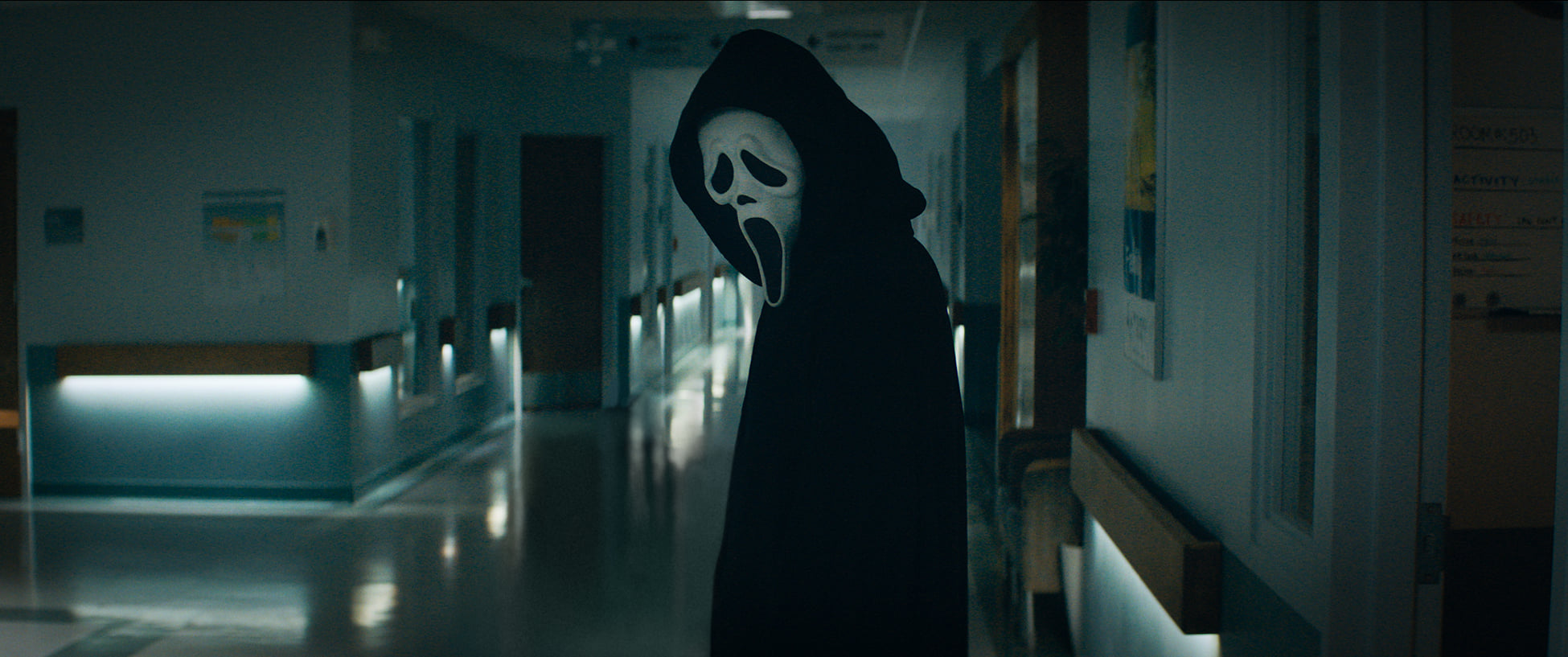
Film Critic Martha Roche praises Scream (2022) as a successful update to the Scream franchise, made with a clear love and respect for the original film
Wes Craven’s original Scream is one of the most influential horror films of the last 40 years. With three sequels, the most recent a relative flop from 2011, and a massive dedicated fanbase, it was an intimidating task to create a fifth entrant to the franchise, especially one adopting the name of the original, and the first made without the late, great Wes Craven directing. The reason Scream (2022) succeeds is the clear love and respect which the writers and directors hold for the original series, and the way in which they include and update all the best features of the original.
Scream follows an all-new cast of Woodsboro teens forming both the suspect and victim lists, alongside ex-Woodsboro resident Sam (Melissa Barrera) and her boyfriend Richie (Jack Quaid), who return to town after Sam’s semi-estranged sister, Tara (Jenna Ortega) is attacked by the newest Ghostface. Unhappy with the police response, and assisted by a veteran of the Ghostface killings, Dewey Riley (David Arquette), they investigate the killer, looking to Tara’s friends as suspects. Other legacy characters, the incomparable Gale Weathers (Courteney Cox) and final girl extraordinaire Sidney Prescott (Neve Campbell), also return to Woodsboro in the hopes of ending the Ghostface murders once and for all.

The Scream films at their best are slasher who-dunnits, and this ‘requel’ – a term defined by Mindy (Jasmin Savoy-Brown) as a cross between a reboot and a sequel which facilitates the return of a well-loved franchise à la The Force Awakens, or Halloween (2018) – embodies that tone brilliantly. It has the best balance of comedy and horror since the original with violent, fairly graphic kills and the sort of witty meta-commentary which Scream (1996) popularised, but it also feels fresh. One way they achieve this is by returning to the ‘Stab’ films, the franchise-within-a-franchise introduced in Scream 2. This facilitates the in-world debate of ‘requels,’ a rejig of Randy’s (Jamie Kennedy) classic rules of horror scene, and a truly meta approach to the film, especially in relation to the debate on ‘elevated’ horror. I will acknowledge that this means the film is not especially accessible to non-Scream fans.
Much as the original Scream rewards horror fans with inside jokes, visual references, and characters who spout horror trivia as soon as they breathe, Scream (2022) contains plenty of humour, imagery, and even sound-tracking choices (such as an entertaining diegetic ‘Red Right Hand’ needledrop) which may fall flat for viewers who aren’t familiar with the Scream films, or horror films in general. I do not think this is a downside (since most people would not expect the fifth film in a series to be accessible to a non-fan), and as a fan myself, I found it to be one of Scream’s greatest strengths, especially in persuading viewers that this is not just a cash grab, but instead a love-letter to Craven’s masterpiece (as indicated by the film’s dedication ‘For Wes’). However, I would warn anyone not familiar with the original to give it a watch before seeing this film.
Scream’s central characters are interesting, entertaining, and developed
Playing on emotions as well as fear is essential for a strong slasher and Scream achieves this with some really tragic deaths and a good focus on character relationships. Especially following in the footsteps of Sidney, widely considered one of the best final girls of all time, it is essential to have characters you root for, and this is achieved through a strong ensemble cast. While the odd character is more forgettable, Scream’s central characters are interesting, entertaining, and developed, with realistic teen dialogue among the younger group – something many writers struggle with.

Unfortunately, Barrera’s Sam is possibly the worst performance of the film, occasionally lacking the sincerity and, frankly, interest of the surrounding cast. This is not to say that the performance is bad, but its weaker elements are emphasised by the strength of her scene partners and she often feels a little flat. Stand-out performances come from Jack Quaid’s utterly charming Richie and Jenna Ortega’s 21st century Casey Becker, who provides the best opening sequence since Drew Barrymore’s original, almost matching it in emotion and intensity. The legacy cast are also stellar, their characters suitably different from the previous films in a way that feels authentic, with their off-screen development neatly applied to their on-screen arcs.
Other than an overshadowed lead, my main complaints are slightly heavy-handed cinematography (Dutch angles are fun, but a little overused), a bizarre hallucinatory sub-plot, and a personal desire for more practical effects (one kill in particular was just a bit too CGI). However, these are really minor issues, especially for a film which was so highly anticipated. It is well-paced, with a number of great twists, a brilliant third-act reveal and sequence, and some of the most harrowing chase scenes of the series (a nail-biting hospital sequence is particularly unforgettable).
Verdict:
Scream (2022) is funny, scary, and extremely entertaining. It is an excellent contribution to the Scream series, and I am very excited about what it represents for the future and continued revival of great ‘schlocky’ horror.
Rating: 9/10
Scream is out now in cinemas
In the mood for more thrillers? Have a look at these Redbrick Film articles:

Comments